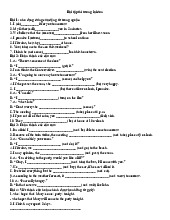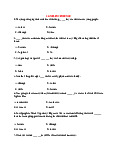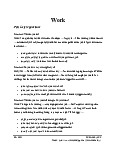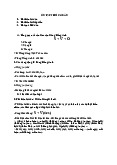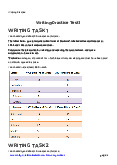

Preview text:
How to Make Requests and Offers in English
Making requests – asking someone to do something for you
These are the three most common ways for making requests:
“Could you open the door for me, please?”
“Would you mind opening the door for me, please?”
“Can you open the door for me, please?’
Speaking tip: could and can are followed by the verb without to Would you mind -ing is followed by the verb and .
Making requests – asking if you can do something
Here are the four most common ways for making requests (when you want to do something):
“Can I use your computer, please?”
“Could I borrow some money from you, please?”
“Do you mind if I turn up the heating?”
“Would you mind if I turned up the heating?”
Speaking tip: Could is more polite that can.
Do you mind if…” is followed by the verb in the present tense, but would you mind
if… is followed by the verb in the . past tense
When you’re using these two sentences, don’t use please. It’s already polite enough!
Offering to do something for another person
You can make an offer using a phrase like Can I… ?, Shall I… ?, Would you like me to… ? For example: “Can I help you?”
“Shall I open the window for you?”
“Would you like another coffee?”
“Would you like me to answer the phone?”
“I’ll do the photocopying, if you like.”
Shall, can and will are followed by the verb without to.
Shall is particularly British English and is more formal than can. Would you like… is
followed either by a noun, or by an object pronoun and the verb with to. Responding to offers
These English dialogues show you ways to accept or reject offers made to you. “Can I help you?”
“Yes please. I’d like to know what time the train leaves.” “Can I help you?”
“No thanks, I’m just looking.” (In a shop.)
“Shall I open the window for you?”
“Yes please. That would be very kind of you.”
“Would you like another coffee?”
“No thanks.” Or, “No thank you.”
“Would you like another coffee?”
“Yes please, that would be lovely.” Or, “Yes please, I’d love one.”
“Would you like me to answer the phone?”
“If you wouldn’t mind.” Or, “If you could.”
(Don’t answer “Yes, I would”, as this sounds like you expect someone to do it for you.)
“I’ll do the photocopying, if you like.”
“It’s OK, I can do it.” Or, “Don’t worry, I’ll do it.
“Or, “Thank you, that would be great.”
